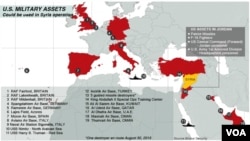WASHINGTON —
With Americans weary over more than a decade of war, and strong memories of the faulty intelligence that led to the invasion of Iraq, skepticism appears to be growing about the proposed military attack on Syria. Polls show a majority of Americans are firmly opposed to such a move.
It was called “shock and awe,” the application of massive military force designed to overwhelm the Iraqi military in 2003. Necessary, U.S. officials said, because of concern about weapons of mass destruction and a desire to end the conflict quickly.
It took until the final days of 2011, though, before the last American troops left Iraq, where an insurgency continues to rage.
The war in Afghanistan has lasted even longer, and American troops continue to fight the Taliban.
And now in Syria… with hundreds dead from apparent chemical weapons, America is considering another attack in the Middle East.
But surveys show many Americans oppose such a move.
David Schenker of the Washington Institute said, “We are war weary. We have gone through Iraq, we have gone through Afghanistan, we have spent blood and treasure. Most people in the United States want to focus on rebuilding the economy here and not get entangled in a foreign embroilment.”
Recent polls show about 60 percent of Americans oppose a U.S. military strike on Syria, while just nine percent support it.
Quinnipiac University pollster Peter Brown said, “They are very much set against the notion of U.S. troops there, or any U.S. aid except for weapons that would not endanger any American lives, such as a cruise missile or a drone strike.”
There is stiff opposition from close allies like Britain.
“There seems to be a certain rush to war, a rush to use military hardware against the Assad regime," said James Boys of London’s King’s College. "There doesn’t appear to be any obvious justification as to why this may be.”
Just before the start of the Iraq war then-Secretary of State Colin Powell made a detailed presentation to the U.N. Security Council. But the intelligence about Iraq’s weapons programs turned out to be wrong.
"In the wake of the Iraq war, where weapons of mass destruction, chemical, biological, possibly nuclear weapons, were the rationale for the war, and it turned out that [former Iraqi leader] Saddam Hussein did not have them, I think that there's going to be a lot of skepticism in the United States, but also abroad," said Bryan Bender of the Boston Globe.
So years of war and skepticism about intelligence are casting a long shadow over decisions by the White House regarding the civil war in Syria.
It was called “shock and awe,” the application of massive military force designed to overwhelm the Iraqi military in 2003. Necessary, U.S. officials said, because of concern about weapons of mass destruction and a desire to end the conflict quickly.
It took until the final days of 2011, though, before the last American troops left Iraq, where an insurgency continues to rage.
The war in Afghanistan has lasted even longer, and American troops continue to fight the Taliban.
And now in Syria… with hundreds dead from apparent chemical weapons, America is considering another attack in the Middle East.
But surveys show many Americans oppose such a move.
David Schenker of the Washington Institute said, “We are war weary. We have gone through Iraq, we have gone through Afghanistan, we have spent blood and treasure. Most people in the United States want to focus on rebuilding the economy here and not get entangled in a foreign embroilment.”
Recent polls show about 60 percent of Americans oppose a U.S. military strike on Syria, while just nine percent support it.
Quinnipiac University pollster Peter Brown said, “They are very much set against the notion of U.S. troops there, or any U.S. aid except for weapons that would not endanger any American lives, such as a cruise missile or a drone strike.”
There is stiff opposition from close allies like Britain.
“There seems to be a certain rush to war, a rush to use military hardware against the Assad regime," said James Boys of London’s King’s College. "There doesn’t appear to be any obvious justification as to why this may be.”
Just before the start of the Iraq war then-Secretary of State Colin Powell made a detailed presentation to the U.N. Security Council. But the intelligence about Iraq’s weapons programs turned out to be wrong.
"In the wake of the Iraq war, where weapons of mass destruction, chemical, biological, possibly nuclear weapons, were the rationale for the war, and it turned out that [former Iraqi leader] Saddam Hussein did not have them, I think that there's going to be a lot of skepticism in the United States, but also abroad," said Bryan Bender of the Boston Globe.
So years of war and skepticism about intelligence are casting a long shadow over decisions by the White House regarding the civil war in Syria.







